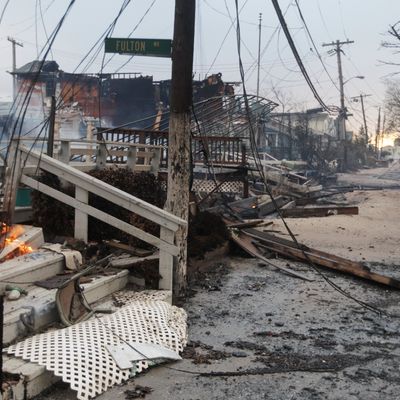
At Breezy Point, they were as ready as they could be. The Queens beach community, a blue-collar haven for city firefighters and cops, had been evacuated on Sunday. On Monday, a couple of miles east of the town on Rockaway Point Boulevard, the sole access road to the Peninsula, the entire Roxbury Fire Department was gathered at the fire station—all ten active volunteers. At 6:25 p.m., the bad news started. Floodwaters from the bay had started to slip under the north wall of the firehouse–Mike Colleran, 33, wrote the time on the blackboard. The ocean was rising, too, surging in from the south. It was still hours before high tide, not a good sign. At 7:30 p.m., the water had risen to almost four feet in the garage, covering the wheels of their only truck. The vollies, one of nine volunteer companies in the city, were forced upstairs into the attic.
At about 8 p.m., one of them looked out the window. “Holy crap,” he said: Breezy was burning. Gazing at the fire, Mary Colleran, Mike’s mother and an EMT, said it looked like a bright-orange caterpillar undulating in the distance. But the vollies couldn’t move. “We were waiting for the water to go out,” said Mike Colleran.
Frantically, they tried to sound the alarm. “We were shouting into the portable radio, ‘Mayday, Mayday.’ Nobody was answering,” said Colleran. Then at 9:12, Colleran was able to get a text through to an FDNY dispatcher. Dawn Lappe, a ten-year veteran, showed the message to her supervisor. But it was useless. The bay and the ocean had met—Breezy was under shoulder-high water. “We weren’t sending anybody out,” she recalled, “We had a fire truck floating down the street. The word came down. Let the buildings burn.” For Lappe, it was heartrending. “In my ten years, I never told people that needed help that we weren’t responding,” she recalled in tears. “I was telling old ladies to get on their roofs in 70-mile-an-hour winds.” It wasn’t until about 10:30 that the tide receded enough for the Roxbury vollies to mobilize. They rolled through two feet of water and linked all five of their hoses together, which Colleran helped pull two and a half blocks into the blaze. The hydrants had no pressure, so they sucked up floodwater, fighting fire with flood.
Mike Colleran, who’s been responding to fires since he was a teenager—his father is the vollies’ chief—found himself on the nozzle, joined by an off-duty FDNY lieutenant. But Colleran had never faced anything like this. “The house in front of us is burning. The one to the right is catching fire. The wind is blowing so hard that flame is touching the next house.”
The fire was overwhelming the vollies—with one hose, their effort was mostly symbolic. Then, at 11:37, the cavalry arrived. Assistant Chief Joseph Pfeifer, who’d been vacationing on Breezy Point for years, was the first commander on the scene—he’d been the first commander on 9/11, too. Pfeifer was amazed by the fire’s intensity. “When pipes melted, gas was released and houses exploded 50 feet in the air,” said Pfeifer. At 3:39 a.m. Tuesday, Pfeifer put in yet another call for reinforcements. The FDNY was battling two other big fires in the Rockaways—15,000 distress calls had come in that day. Still, 200 firefighters were sent to Breezy. They strapped themselves to tower trucks, spraying water from 70 feet in the air while the wind gusted to 60 miles an hour. “Some firemen were looking at their family’s houses. They kept going.”
Pfeifer knew he couldn’t put out the fire with hoses; containing was their only option. “We had to flank it,” he said. “I stopped it going north.” Then, finally, they got lucky. “The wind shifted: That gave us enough time to stop it out of the western flank.” By 6 a.m., they had the fire mostly under control. The next day, Pfeifer was standing in a field of rubble. A few of his friends from Breezy, the families of other firemen and cops, had returned to salvage valuables from the ruins—111 houses had been lost. But they stopped to hug one of their own, who’d saved what he could. “We will rebuild,” Pfeifer told them.





























